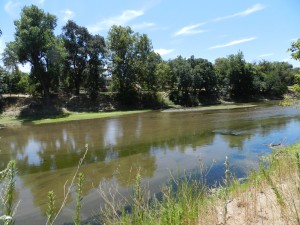
Here in the northern San Joaquin Valley, there’s no better way to curry political favor than by assailing the state’s proposals to increase unimpaired flows on the Stanislaus, Tuolumne, and Merced Rivers. And even though it’s a losing position, everyone’s doing it.
“Water grab,” they say, almost in unison. Invariably, talk of “our water” is followed by a lengthy recitation of the economic harm to the region when water from local rivers is allotted for fish, delta farmers, the delta ecosystem, and other long-suffering entities.
Consider this: The Tuolumne River now receives between 15 and 17 percent unimpaired flows. That means well over 80 percent of the water from the Tuolumne River is diverted before it reaches the San Joaquin Delta. Most of the diversions are for agriculture.
Those who say an increase in unimpaired flows will harm local economies are right. But such economic arguments don’t just apply locally. In today’s water world gone mad, one person’s economic gain is another’s economic loss.
When water is seen in purely economic terms, values get tossed aside. Among the first to go are “fairness,” “sustainability,” and “objectivity.”
How fair is it to boost one economy at the expense of another? In recent years, the salmon industry has taken huge losses. Scientists say a major reason is reduced river flows. Increases in unimpaired flows are meant to help salmon fishermen and all the others who benefit from salmon.
Delta farmers are also suffering as salt water continues a steady intrusion landward. Recreational activities, wetlands, wildlife—all depend on water. How fair is it to take 80 percent of “their water”?
How much of the recent Valley agricultural boom is sustainable? Will the almond boom bust? How realistic is it to keep planting permanent crops solely dependent on groundwater or, at best, dependent on very junior water rights?
In today’s insane water game, everyone’s an instant expert on everything from fish to statistics. Problem is, the science and math always seem to work in favor of the people with skin in the game. Disinterested research is routinely ignored in favor of “objective” studies that favor those who paid for the studies.
As soon as we turn the water game into a bidding war, the only winners are the highest bidders, and that’s only over the short term. And as soon as we discard values like “fairness” and “sustainability,” public resources cease to be “public.”
There’s no question water has economic value, but that value should apply fairly to everyone. Water also has recreational, aesthetic, and intrinsic value. These values aren’t easily measured with dollar signs.
We are in dire straits today in part because too many of us have been willing to allow water to become commodified. One noxious result is that some Valley towns, invariably poor, lack potable drinking water even while the land they live on continues to produce huge profits for those who’ve wrested control of water through economic prowess and political machination.
Water belongs to everyone and everyone needs it. Until we understand its value as opposed to its price, we’re all losers in the water game.
